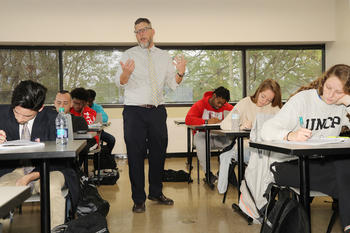
When Avery Locklear enrolled in a course titled “History of Rock N’ Roll” in the fall of 2017 she had no idea it would become her favorite class.
She also couldn’t imagine the impact The University of North Carolina at Pembroke Professor of History Ryan Anderson would have on the rest of her time as a student and life afterward.
“Before this course, I struggled with my confidence in the classroom,” said Locklear, who graduated in 2019 and now practices law as a labor and employment attorney in Wilmington, N.C. “Admittedly, law school never occurred to me. That was, until Dr. Anderson took interest in my professional and educational growth.”
She worked closely with Anderson on her final project in the class, a paper about the historical significance of the Guns N’ Roses hit song, “Paradise City.”
“Dr. Anderson immediately saw something in me that I did not,” Locklear said. “He suggested developing my paper into a larger project and emphasized it would be beneficial if I wanted to continue my education beyond undergraduate studies.”
Locklear said Anderson became a mentor as they worked together to develop her paper, which was eventually published in a collection of UNCP’s best student essays.
“Through discussions with Dr. Anderson, I became excited about my future and what it could be,” Locklear said. “And during this time, I gained the confidence to apply to law school.”
Anderson has mentored countless UNCP students like Locklear by investing his time to ensure their success. His popularity among students as a demanding yet encouraging professor and his faculty colleagues' respect for his skills as an educator makes it no surprise that Anderson was recently selected as UNC Pembroke’s recipient of the 2024 UNC Board of Governors Award for Excellence in Teaching.
Anderson will receive a commemorative bronze medallion, a cash award and be recognized at Spring Commencement. The Board of Governors annually selects 17 outstanding faculty members for the awards, representing each of North Carolina’s 16 public universities and the North Carolina School of Science and Mathematics.
A native of Fort Smith, Arkansas, who also spent his high school years in North Carolina and Florida, Anderson has always enjoyed the classroom setting. “I saw myself as a teacher from a pretty early age and others saw that in me too,” Anderson said. “Early on, I thought I was going to coach high school baseball and teach high school history, but that path changed over the years.”
After earning a bachelor’s degree from Florida State University, Anderson began his career as a teaching assistant at the University of North Carolina at Wilmington, where he earned a master’s degree in history. Anderson completed a Ph.D. in history at Purdue University.
He joined the UNCP faculty in 2007 as assistant professor of history, eventually earning the rank of professor in 2018. He is also the coordinator of the American Studies minor. From 2014 to 2019, he served as director of the Pembroke Undergraduate Research and Creativity Center (PURC), which supports and advances undergraduate research programs.
At UNCP, Anderson said he has continued to grow as a teacher thanks to the high bar for faculty performance in the classroom.
“When I got hired, we already had a strong tradition of excellent work in our department,” Anderson said. “It was made clear to me that you wouldn’t just be a proficient teacher, but an excellent one. Watching the professors in our department showed me how to take my strengths to a different level.”
Dr. Jamie Mize, associate professor of history, attests to her colleague’s ability to connect with students.
“Students frequently comment on the discipline and rigor in Dr. Anderson’s courses, and this is something they speak of with respect,” Mize said. “Ultimately, Dr. Anderson strongly believes in the intellectual capacity of his students, and he works very hard to bring this out and see them succeed.”
Anderson says teaching is a source of gratification, even if it doesn’t come instantly.
“In teaching, you’re playing the long game,” Anderson said. “You don’t see the rewards of the work very soon, but they do come, and they come in amazing ways.”
Anderson says he measures success by his ability to help all types of students—those who naturally do well in the classroom and those who may need more support.
“When I think of someone like Avery Locklear, she was talented and driven,” Anderson said. “It’s amazing to reflect upon somebody like her and see her success in a relatively quick span of time.
“But I also think about students like one I had last fall, who was a good person. She probably could have done better grade-wise in the class, but she was working through some things. In the last few years, I’ve tried giving people a lot of grace in class, giving them a pat on the back and encouraging them. That student left a note under my door at the end of the semester that said, ‘Thank you. You’re the kind of professor that makes people like me stay in school.’ To me, that’s as valuable as the student who goes on to law school.”